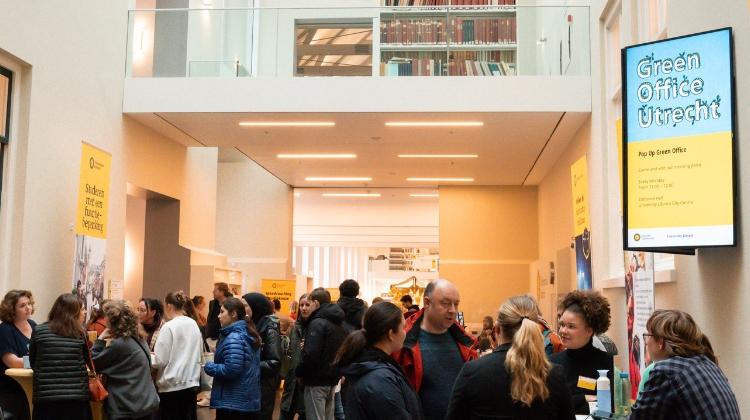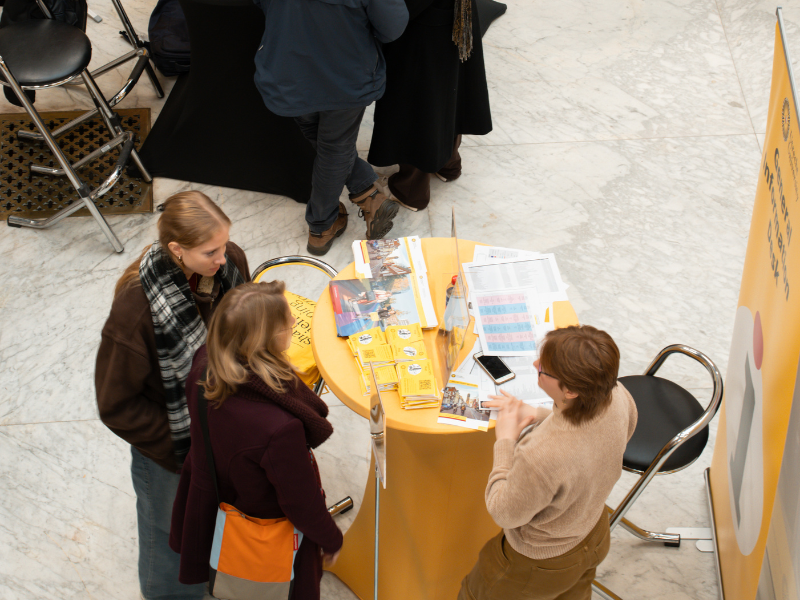'We need to thank the students’
Humanities ends gift card rewards for Open Day volunteers

The faculty of Humanities at Utrecht University is no longer handing out a thank-you voucher worth, on average, 25 to 50 euros to students who volunteer on open days. “The faculty used to allocate the designated budget they had for thanking the students at the open days to buy Yesty Giftcards. However, we know that stricter tax policies are coming regarding the purchase and gifting of cards, hence we changed the way we express our gratitude,” explained Annemiek van Gorp, Head of the Communications and Marketing department of the Faculty of Humanities. The tradition has come to an end – not because of budget cuts, but due to a stricter fiscal policy as of 2026.
The issue surfaced last academic year, prompting a joint effort from staff and students to find a fix. The previous student assessor, Finn Siemons, and the current student assessor, Annebet van Rijn, were deployed to find a solution. “Siemons then came up with the idea of making the money for the gift cards available for community events for those who volunteered,” explains Van Gorp.
Study association boards are now expected to find people interested in serving as representative student helpers. This could be students providing testimony, opinions, and experiences during Open Days, or volunteers themselves, to inform students about their studies at the event itself. In return, the ‘thank you’ event, to which volunteers are invited, will be funded by the university faculty.

Reactions to the change
Van Gorp admits she has received mixed reactions, with some students expressing disappointment and requesting individual compensation. Others welcome the change.
One student with mixed feelings about this change is Ruben, who volunteered at previous open days. “I was disappointed that UU would no longer give students gift cards, because helping at the open day usually costs you the entire day. Not to moan, but it was actually very tiring.” He stresses that students working at the open day provide public relations for the university and that their efforts may help attract more students. “Participating in the open day is work. You are creating value for the university. I want to be compensated for it. I could’ve spent that day at my part-time job”.
After learning the reasoning behind the lack of gift cards, his opinion changed. The student could sympathise with the faculty and found it almost comical that UU was “paying students illegally”. Still, he finds that “a thank-you event feels quite misguided because that means offering up more time. I think that study associations will have a really hard time finding students to help. I would only help under these conditions if I knew what the ‘thank you event’ was and when.”
As an alternative, he suggests “employing students who are already on a payroll through UU or hiring people from TopSelect (a payroll agency that serves as the in-house staffing agency for UU) or UU directly. This was a possibility that Van Gorp and her team considered, but it didn’t fit the budget because TopSelect also collects payments from the employer, and the faculty would employ a large number of students from over twenty programmes. However, other faculties such as Veterinary Medicine and Law, Economics and Governance, have been offering reimbursement through a Topselect contract for all students. Van Gorp points out that this is only possible for them because they have fewer programmes and thus fewer students to pay.
Not all students, however, view this change negatively. Fotini Theophanous, the secretary of the study association Euphorion, is one of them. She will be volunteering at the Open Days for the Literary Studies section. Fotini did not even know that previous years had received this compensation, and she was not expecting any sort of reward upon signing up. “I wouldn’t mind doing it without something in return. I genuinely love doing this sort of stuff”.
Van Gorp is counting on this type of excitement. “I trust that we won’t have further problems because a lot of students love their programme and love to talk about it, but we still want to thank them in any way we can.”
Comments
We appreciate relevant and respectful responses. Responding to DUB can be done by logging into the site. You can do so by creating a DUB account or by using your Solis ID. Comments that do not comply with our game rules will be deleted. Please read our response policy before responding.